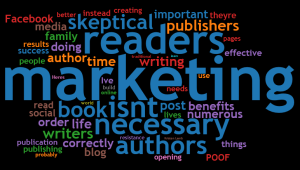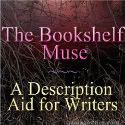 Here you will find a selection of the best of the blogsphere from the past week. Grab your coffee, straighten the glasses or spritz those contacts and above all – enjoy.
Here you will find a selection of the best of the blogsphere from the past week. Grab your coffee, straighten the glasses or spritz those contacts and above all – enjoy.
Inform & Inspire
Hugh Howey: Listen to Yourself. “I just had a reader point out an ancient blog post of mine, and boy, does it make for an interesting read in light of the success of WOOL. A snippet: Here’s what I was thinking: First, the books come out in a serial format, instead of one giant chunk. Each section would be around 30 pages (10K words) and have a basic beginning and end with a little hook to keep the reader enticed. At the end of ten sections, you have a completed work (and it just so happens, my first two books have this precise format).”
Kristen Lamb: Want to Be Successful? Beware of End-of-the-Rainbow Thinking. “Our culture has been infected with a disease of distortion, what I’m calling “End-of-the-Rainbow-Thinking.” We can all be guilty of this. We see the mega-best-selling-indie, the New York Times best-selling author, the successful small business, the guy with the big house or the family who lives debt-free and we scope-lock on the end result as if this “success” POOF! erupted from the ether.”
Writing
Tiffany Lawson Inman: Emotional Barrier in Fiction: Why is it so important for you to learn how to cross it? (Part One). “Most people are afraid of the thoughts and situations that forced them to feel hate, shame, guilt, terror, deep sadness, and dread. Humans are blessed to have the ability to emote, but they also have within them an emotional barrier to protect them from feeling some of those nasty things. It also protects them from revisiting past emotions. Unfortunately this emotional barrier makes emotions one of the most difficult area of fiction to write.”
Janice Hardy: Open Up! Writing the Opening Scene. “The primary goal of an opening scene is to make readers want to read the next scene. You’d be surprised how often this is forgotten, because the focus is on establishing the setting, introducing the protagonist, and telling readers all about the cool story waiting for them. These are all important things, but on their own they’re not going to do what an opening scene needs to do—grab readers and keep them reading.”
Larry Brooks: How to “Write Like Rowling”. “Author names don’t come any bigger than J.K. Rowling. And because of that, readers regularly request a deconstruction of the Harry Potter oeuvre. Some, I suspect, want to see the theories disproved. Others simply want to see it exposed, lifted from the pages to becomes an example we can learn from. So here you go.”
Roz Morris: How to develop a writer’s instinct. “How do we develop a writer’s instinct? How do we get the confidence to strike out creatively? How might we become more original in our writing?”
Ava Jae: World-building Tip: 15 Details to Remember. “While there are probably hundreds of details that go into building a world for your novel, I’ve narrowed down a list of fifteen particularly important ones (at least to me), to help you develop your world.”
Writer Support
Joanna Penn: Lessons Learned From 2 Years As A Fulltime Author Entrepreneur. “Two years ago, I gave up a secure career as an IT business consultant for large corporates, earning a six-figure income, to become a full-time author-entrepreneur. Yes, I understand that writing is not just about the money, and yes, I do value creativity for its own sake. But this is also my life and pays the bills these days.”
Cate Russell-Cole: Getting Real About Writer’s Burn Out and Social Media Demands. “Lack of response can come down to time availability, overload, required response numbers… and the need for a balanced life which includes family, recreation and rest. Those of us who have the sense to balance our time, or step away from “must-do to succeed” tasks, can pay a price in public criticism and the god called search engine rankings. It’s time for technology and all writers to stop cracking the whip and set better standards. Our online culture needs to allow people to lead balanced lives! We are creating our own hell… but we can create a way out of it, by changing our expectations and what we pressure other writers to do.”
Ali Luke: Write More Easily: Understanding, Embracing and Moving Beyond Resistance. “In this month’s seminar for Writers’ Huddle, I talked about resistance – a powerful force that can stop us writing, if misunderstood and unchecked. Resistance is feeling you don’t want to do something – even when you know you’ll feel good afterwards. Here are just a few of the things I’ve felt resistance about in my life … do any of them sound familiar to you?”
Marketing
Jane Friedman: Why Don’t Publishers Believe in Author Websites? “It’s not unusual for authors to be told by their publishers that an author website isn’t necessary or effective. Publishers may advise authors that they’re better off creating and maintaining a Facebook page instead. It came up again, yesterday, at a Digital Book World marketing conference. I didn’t attend, but I followed the Twitter stream. Here’s the conversation that happened.”
Darcy Pattison: Why Authors Should Believe in Their Websites. “When discussing book marketing, a useful concept from marketing people is the idea that there are three ways to reach people. Paid media, which is the traditional advertising. This type media will attract strangers who originally knew nothing about you and your book. Owned media…”
Jami Gold: Branding 101: What Is Your Brand?. “Our author brand is just others’ impression of our stories, of our writing, or of us as a person or an author. Because of this, we can (and probably should) make conscious decisions about who we want to be, both in real life and in our brand.”
Kristen Lamb: Our Author Brand—The Choice Between Meaningful and Empty, Sad Imitation. “There are marketing technophiles who will gladly (and often for a fee) set up our social media to act on its own. We spend an hour writing clever snippets, plug them in and POOF! A machine can tweet, post on Facebook, post about our blog and we can happily do whatever other more important thing we have to do without ever worrying our pretty little heads about social media. Yet, I would say that, whenever we consider our author brand, we need to also consider whether it is authentic, because in the Digital Age, authenticity is something people are desperately seeking. In the sea of 0s and 1s we long for that human touch and voice that gives information its meaning.”
Jo Linsdell: Promoting a Virtual Book Tour. “Whether you want to launch your new release with a bang or put some life into an older publication, virtual book tours can be an effective marketing strategy. They can be done from the comfort of your own home and at little or no cost. The benefits of doing a virtual book tour are numerous. They do however need to be done correctly in order to see good results.”
Anne R. Allen: The Ebook Market No Author Should Ignore: Think Globally!. “One of the biggest changes the e-reader has brought to the publishing industry doesn’t get much cyberink in the online book community. It’s the huge international market that’s opening up now that we don’t have to pay to ship physical books around the world.”
Social Media
Marcia Richards: How To Power Up Your Pinning. “If Pinterest still seems like it might be “too addictive”, a “time-waster”, or too “hard to use as a marketing tool”, think of it as a new twist on the old practice of tearing out magazine pages of recipes, home decor, fashion or inspirational articles and filing them in a folder for future reference or sharing with your Mom or a friend.”
Francis Caballo: 4 Time-Saving Social Media Tips for Authors. “What is time suck? It’s the hours of time you can unintentionally spend in front of your computer reviewing Facebook posts, retweeting your Tweeps, and uploading photos while your writing and maybe even your family await your undivided attention.”
Publishing
Kristine Kathryn Rusch: Addendums, Rights Grabs & Agents (Yet Again). “Recently, I got e-mail from another career writer, talking about a rights grab from a traditional publisher. I saw the document in question; it’s egregious. I do not have permission to talk about this particular document nor would I, since it’s proprietary, but it’s the kind of document I’ve seen at least six times in the last two years. These documents are addendums to publishing contracts. Since the rise of e-books, publishers have issued the addendums frequently and often en masse.”
Susan Spann: Do You Own Your Copyrighted Works?. “Many authors will view the title of this post with a skeptical eye. How could I not own my copyrighted works? I wrote them, I own them. Question answered. Or is it?”
Phi Tran: Goodreads’ New Censorship Policy Causing a Stir Among the Frequently Reading. “If there’s one thing most readers find controversial – it’s censorship. If you mix a bunch of highly literate, well-informed readers on a social network like Goodreads and tell them they can no longer express their opinions on authors of said books – well, you’re just asking for trouble because that’s censorship. Right?”
Dianna Dilworth: Pubsoft Lets Authors & Publishers Sell eBooks Direct. “”
Technology
Amit Agarwal: How to Migrate your Blog from Blogger to WordPress. “Your blog (abc.blogspot.com) is hosted on Blogger but you would now like to move your blog from Blogger to WordPress (self-hosted) with a personal domain name like abc.com. What is the easiest way to switch from Blogger to WordPress without losing search traffic and your existing subscribers?”
Dianna Dilworth: ReadRover Helps Children’s Book Authors Create Apps. “Children’s book authors can use the platform to build children’s eBook apps, as well as to publish these titles in the App Store or in the ReadRover app.“









Thanks for including me in your round-up, Gene! Much appreciated!
A delicious menu of posts, Gene! Thanks for including mine! Looking forward to reading Hugh Howey’s.
Gene, I think you’re giving my fairy godmother a run for her money. Thank you!
Pingback: Mind Sieve 9/30/13 | Gloria Oliver
Pingback: Finding a Balance | sebgwrites